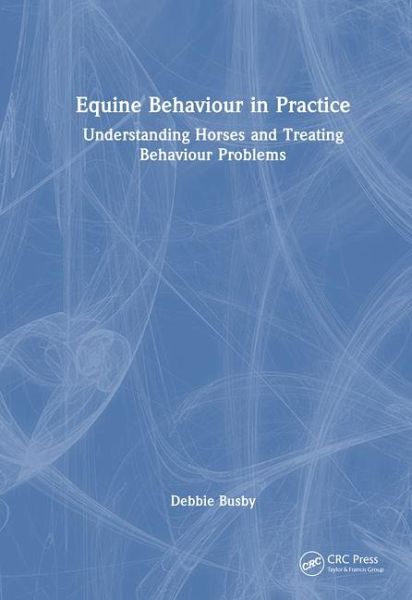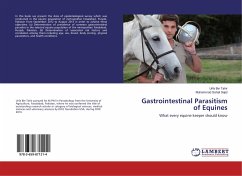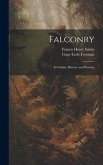- Gebundenes Buch
- Merkliste
- Auf die Merkliste
- Bewerten Bewerten
- Teilen
- Produkt teilen
- Produkterinnerung
- Produkterinnerung
Combining an in-depth exploration of equine behaviour with clinical practice, Applied Equine Behaviour focuses considers how and why horses sometimes struggle to cope and provides a comprehensive explanation of how to consult on and treat a range of equine behaviour problems.
Andere Kunden interessierten sich auch für
![Concise Textbook of Equine Clinical Practice Book 4 Concise Textbook of Equine Clinical Practice Book 4]() Andy DurhamConcise Textbook of Equine Clinical Practice Book 4189,99 €
Andy DurhamConcise Textbook of Equine Clinical Practice Book 4189,99 €![Equine Science - Applications and Implications of New Technologies Equine Science - Applications and Implications of New Technologies]() Equine Science - Applications and Implications of New Technologies135,00 €
Equine Science - Applications and Implications of New Technologies135,00 €![Equine coat color Equine coat color]() Equine coat color23,99 €
Equine coat color23,99 €![Gastrointestinal Parasitism of Equines Gastrointestinal Parasitism of Equines]() Urfa Bin TahirGastrointestinal Parasitism of Equines34,99 €
Urfa Bin TahirGastrointestinal Parasitism of Equines34,99 €![Equine Anatomy Equine Anatomy]() Equine Anatomy37,99 €
Equine Anatomy37,99 €![Zoo Animals Zoo Animals]() Geoff HoseyZoo Animals76,99 €
Geoff HoseyZoo Animals76,99 €![Falconry: Its Claims, History, and Practice Falconry: Its Claims, History, and Practice]() Gage Earle FreemanFalconry: Its Claims, History, and Practice41,99 €
Gage Earle FreemanFalconry: Its Claims, History, and Practice41,99 €-
-
-
Combining an in-depth exploration of equine behaviour with clinical practice, Applied Equine Behaviour focuses considers how and why horses sometimes struggle to cope and provides a comprehensive explanation of how to consult on and treat a range of equine behaviour problems.
Hinweis: Dieser Artikel kann nur an eine deutsche Lieferadresse ausgeliefert werden.
Hinweis: Dieser Artikel kann nur an eine deutsche Lieferadresse ausgeliefert werden.
Produktdetails
- Produktdetails
- Verlag: Taylor & Francis Ltd
- Seitenzahl: 234
- Erscheinungstermin: 11. März 2025
- Englisch
- Abmessung: 254mm x 178mm
- ISBN-13: 9781032947150
- ISBN-10: 1032947152
- Artikelnr.: 71554104
- Herstellerkennzeichnung
- Libri GmbH
- Europaallee 1
- 36244 Bad Hersfeld
- gpsr@libri.de
- Verlag: Taylor & Francis Ltd
- Seitenzahl: 234
- Erscheinungstermin: 11. März 2025
- Englisch
- Abmessung: 254mm x 178mm
- ISBN-13: 9781032947150
- ISBN-10: 1032947152
- Artikelnr.: 71554104
- Herstellerkennzeichnung
- Libri GmbH
- Europaallee 1
- 36244 Bad Hersfeld
- gpsr@libri.de
Debbie Busby graduated with a first class degree in psychology before going on to gain a distinction for her MSc in applied animal behaviour and welfare from Newcastle University. She grew up with horses and learned to ride aged 7 on Badger, one of the last retired pit ponies in England. Her first experience of using positive reinforcement to influence behaviour came when she had to ride Badger down a busy dual carriageway into Manchester to farrier Jack Priday's forge and was immediately sent to the next-door shop to buy a quarter of mint imperials. Somewhat bemusedly thinking they were for her, she soon learned who their actual recipients were: the ponies! Later Debbie looked after championship-winning harness racing horses and competed in eventing and dressage after studying for British Horse Society exams. After this she concentrated on teaching, especially coaching to improve performance, and developed a popular empathic and encouraging teaching style. At the same time she developed a fascination with the behaviour problems she saw in her clients' horses. Throughout this time, Debbie was partnered by her beloved chestnut thoroughbred cross Rusty, originally a dangerous challenge but emerging as a treasured companion, about whom you're sure to read in the pages of her books and articles. Debbie Busby founded her successful international equine behaviour consultancy in 2006, and as a clinical equine behaviourist she works with vets and caregivers to resolve complex equine behaviour problems, as well as acts as expert witness in equine legal cases. A full member of the Association of Pet Behaviour Counsellors and a Certificated Clinical Animal Behaviourist, Debbie was only the third practising equine behaviourist in the UK to qualify to register at the highest level with the Animal Behaviour and Training Council (ABTC) as a clinical animal behaviourist specialising in horses. She is a graduate member of the British Psychological Society and an academic member of the International Society for Equitation Science. As a registered member of the British Association for Counselling and Psychotherapy she practices therapeutically within a Transactional Analysis framework, and she has drawn on this modality to develop a model promoting effective communication between horse owners and animal practitioners. Debbie's intention as a behaviour consultant is to help horses and their owners to cope with the challenges of multispecies living: the domesticated horse is the same animal that ran wild over plains and steppe; domestication came late in this animal's history. Sometimes the mismatch between what we expect of our horses and what they need for physical and psychological health can be overwhelming, and behavioural problems often follow. Through her knowledge, experience and expertise Debbie helps owners understand and resolve the difficulties their animals are experiencing, achieving this in a way that is psychologically and ethologically sound. Debbie writes books and articles and delivers lectures, presentations and workshops internationally on all aspects of equine behaviour, consulting and human behaviour change. She is a primary author of a book and a chapter contributor of another book. She has had articles published in a number of peer-reviewed journals and speaks at academic and professional conferences around the world. As well as working with horses in the UK, Debbie travels to Spain, Turkey and the Middle East to research equine welfare and training practices and to consult with horse owners. Until the demands of her consultancy work took over, Debbie partnered with a trail riding company in Wadi Rum, Jordan, to organise week-long desert rides, sleeping under the stars each night and crossing the spectacular desert of mountains on strong, gentle, family-bred Arab horses. Debbie supervises university students on behaviour courses at master's level and mentors new behaviourists coming through professional routes. She is currently conducting interdisciplinary doctoral research in horse-human relationships at Manchester Metropolitan University in the contexts of riding, sustainability and interspecies wellbeing.
PART 1: Who is The Horse? From Evolution to Domestication 2. Equine
Ethology 3. Equine Senses and Communication PART 2 How Horses Learn 4.
Fundamentals of learning theory 5. Further learning theory 6. Physiology of
behaviour PART 3 Equine Welfare 7. Welfare and Wellbeing PART 4 Behaviour
Consulting 8. Diagnosing behaviour problems - how to assess a behaviour
problem and identify its likely causes 9. Treatment planning - safety and
situation 10. Treatment planning - behaviour modification 11. Communication
skills and behaviour consulting PART 5 Psychopharmacology Awareness 12. A
behaviourist's guide to psychopharmacology. Appendices
Ethology 3. Equine Senses and Communication PART 2 How Horses Learn 4.
Fundamentals of learning theory 5. Further learning theory 6. Physiology of
behaviour PART 3 Equine Welfare 7. Welfare and Wellbeing PART 4 Behaviour
Consulting 8. Diagnosing behaviour problems - how to assess a behaviour
problem and identify its likely causes 9. Treatment planning - safety and
situation 10. Treatment planning - behaviour modification 11. Communication
skills and behaviour consulting PART 5 Psychopharmacology Awareness 12. A
behaviourist's guide to psychopharmacology. Appendices
PART 1: Who is The Horse? From Evolution to Domestication 2. Equine
Ethology 3. Equine Senses and Communication PART 2 How Horses Learn 4.
Fundamentals of learning theory 5. Further learning theory 6. Physiology of
behaviour PART 3 Equine Welfare 7. Welfare and Wellbeing PART 4 Behaviour
Consulting 8. Diagnosing behaviour problems - how to assess a behaviour
problem and identify its likely causes 9. Treatment planning - safety and
situation 10. Treatment planning - behaviour modification 11. Communication
skills and behaviour consulting PART 5 Psychopharmacology Awareness 12. A
behaviourist's guide to psychopharmacology. Appendices
Ethology 3. Equine Senses and Communication PART 2 How Horses Learn 4.
Fundamentals of learning theory 5. Further learning theory 6. Physiology of
behaviour PART 3 Equine Welfare 7. Welfare and Wellbeing PART 4 Behaviour
Consulting 8. Diagnosing behaviour problems - how to assess a behaviour
problem and identify its likely causes 9. Treatment planning - safety and
situation 10. Treatment planning - behaviour modification 11. Communication
skills and behaviour consulting PART 5 Psychopharmacology Awareness 12. A
behaviourist's guide to psychopharmacology. Appendices








